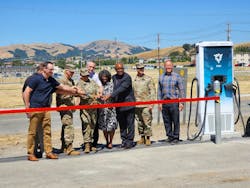U.S. Army Reserve Contracts Techflow to Deliver EV Charging, Microgrid Infrastructure
The U.S. Army Reserve has signed a 5-year agreement with Techflow to design, install as well as maintain EV charging and support microgrid infrastructure at Army Reserve facilities to strengthen readiness and resilience.
The Army Reserve plans to deliver about 2,800 EVs to over 760 facilities to achieve federal emission requirements and climate goals. Army Reserve-funded installation Fort Buchanan in Puerto Rico has 15 charging stations while Fort McCoy, Wisconsin has four charging stations.
The U.S. Army Corps of Engineers awarded an EV charging infrastructure contract to Techflow in 2022. That $34 millon contract covered work for U.S. Army Installation Management Command facilities.
The Army Reserve has also partnered with the DIU to study seven dual-port EV chargers and three more chargers (two dual-port and one single-port) at Parks Reserve Forces Training Area in Dublin, CA (pictured above). The project will not only measure and provide data on usage, uptime, vehicle types (i.e. personal and government), wait times, and mean time to repair but also evaluate Charging-as-a-Service.
“Building off our EV pilot success in California, along with master planning site assessment data we are receiving from the U.S. Army Engineering and Support Center, Huntsville, each Army Reserve Center and Army Reserve-funded installation will receive a tailored package based on their needs to ensure the proper charging infrastructure and resilience solutions are implemented,” said Neville Jordan, Army Reserve Electric Vehicle Program Manager.
While TechFlow will conduct site evaluations, reviews of master plans, iterative design, and construction, the company will also perform the procurement and installation of EV charging stations and the required power infrastructure. Microgrid solutions will also be integrated with EV charging to improve resilience.
The U.S. Army in 2022 outlined a long-term climate strategy that called for a microgrid installed at every possible base by 2035.
